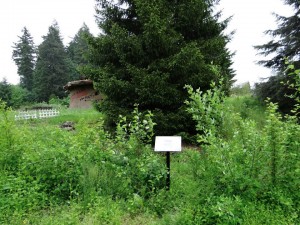Rain Garden Near The Learning Center
 Rain Gardens are a practical way of handling rainwater that runs off of building rooftops and impervious surfaces. Currently, PCC Sylvania has two rain gardens and more are planned. One garden is on the north end of campus near the soccer field’s north goalpost that is intended to catch water coming off the roof covering the Salmon Cobb Bench in the Learning Garden. The other is on the south end of campus where the sideway that passes the bus stops intersects with G Street, and is intended to catch water from the surrounding area.
Rain Gardens are a practical way of handling rainwater that runs off of building rooftops and impervious surfaces. Currently, PCC Sylvania has two rain gardens and more are planned. One garden is on the north end of campus near the soccer field’s north goalpost that is intended to catch water coming off the roof covering the Salmon Cobb Bench in the Learning Garden. The other is on the south end of campus where the sideway that passes the bus stops intersects with G Street, and is intended to catch water from the surrounding area.
Rain gardens are shallow depressions that are planted with native plants, such as red-twig dogwood. Despite the name, rain gardens are usually dry. During and after cloudbursts, rain garden plants absorb water and the garden slowly releases water rather than flooding sewers and causing erosion.
Rain gardens are important for many reasons. According to the Groundwater Foundation and the US Environmental Protection Agency, pollutants in rainwater runoff account for 70% of water pollution. Rain gardens filter water that can carry bacteria, soil, fertilizers, chemicals, oil, and garbage washed from roofs, streets, and other non-soil surfaces. Rain gardens provide habitat for native birds and other organisms. They also reduce the pressure on storm sewers, which in the past contributed to Portland’s sewage overflow problems. Rain gardens are attractive because they provide flowers, shade, and greenery.
Come and see the rain gardens at Portland Community College’s Sylvania Campus!
- Title: Rain Garden near the Learning Garden
- Built: 2010
- Location: Sylvania Campus, West of Parking Lot 14.
- Directions: From the CC building, walk away from the
main parking lots to G Street and turn right. Turn left on the
road leading down to the track and the North Rain Garden
will be on your left behind the Cobb Salmon Bench. - Categories: Plant, Water
